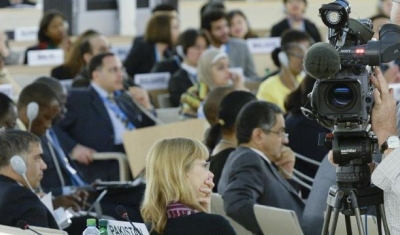A Fruitful Discussion with States on the Future of United Nations Treaty Bodies


Geneva Academy
29 November 2018
On 23 November 2018, the two coordinators of the Geneva Human Rights Platform, Felix Kirchmeier and Kamelia Kemileva organized a briefing for states on the future of United Nations (UN) treaty bodies (TBs).
Around 60 diplomats participated in the briefing which addressed the upcoming review at the General Assembly (GA) and the outcomes of our Oslo Conference, co-organized with the Norwegian Centre for Human Rights, on the meaning of this review for national stakeholders.
‘We’ve been organizing briefings for states on the academic inputs to the 2020 GA review since 2016, along with parallel briefings for TBs members and civil society representatives. The briefings allow us to present and discuss our recommendations and proposals with Geneva-based stakeholders, including diplomats’ explains Felix Kirchmeier.
Development of Synergies at the Domestic Level
The briefing focused on an idea that emerged from the Oslo conference and that builds upon the recommendations entailed in our publication Optimizing the UN Treaty Body System to develop synergies at the domestic level.
‘The idea is that in the middle of a state’s reporting cycle before a specific TB, one member of each of the committees concerned travels to this country to discuss the implementation of the recommendations that were formulated in the last review’ underlines Felix Kirchmeier.
‘If implemented, this measure could fill a potential protection gap resulting from an eight-year reporting cycle and could also contribute to a better implementation and follow-up of TBs recommendations’ stresses Kamelia Kemileva.
The 2020 Review at the Corner
Participants also discussed the tight schedule until the 2020 review as the GA resolution adopted on 19 November (A/C.3/73/L.38) which requires that the UN Secretary-General presents his 2020 TB review report by January 2020.
‘This schedule implies that all stakeholders, including academic institution like us, have only a few months left to submit inputs into the Office of the UN High Commissioner for Human Rights for consideration in this report’ explains Kamelia Kemileva.
Next Steps
The Geneva Academy will continue, via its Geneva Human Rights Platform, to regularly brief states on academic inputs for the 2020 review discussion.
‘We will notably dedicate one of these briefings to address the national impact of TBs. The discussion will be informed by a dedicated study carried out by the University of Pretoria, under the leadership of Professor Christof Heyns, on the national impact of TBs in 20 states, and compared with a similar study carried out 20 years ago’ says Felix Kirchmeier.








